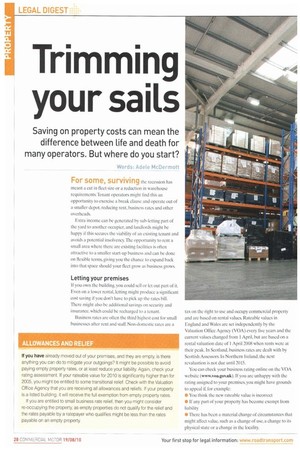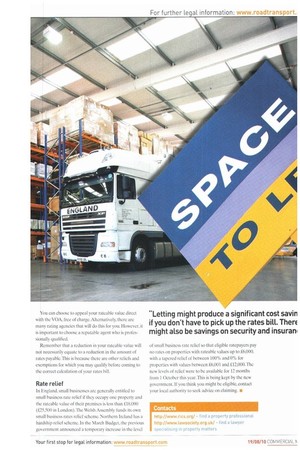Trimming your sails
Page 28

Page 29

If you've noticed an error in this article please click here to report it so we can fix it.
Saving on property costs can mean the difference between life and death for many operators. But where do you start?
Words: Adele McDermott
For some, surviving the recession has meant a cut in fleet size or a reduction in warehouse requirements.Tenant operators might find this an opportunity to exercise a break clause and operate out of a smaller depot, reducing rent, business rates and other overheads.
Extra income can he generated by sub-letting part of the yard to another occupier, and landlords might he happy if this secures the viability of an existing tenant and avoids a potential insolvency. The opportunity to rent a small area where there are existing facilities is often attractive to a smaller start-up business and can be done on flexible terms, giving you the chance to expand hack into that space should your fleet grow as business grows.
Letting your premises
If you own the building, you could sell or let out part of it. Even on a lower rental, letting might produce a significant cost saving if you don't have to pick up the rates bill. There might also be additional savings on security and insurance, which could be recharged to a tenant.
Business rates are often the third highest cost for small businesses after rent and staff. Non-domestic rates are a tax on the right to use and occupy commercial property and are based on rental values. Rateable values in England and Wales are set independently by the Valuation Office Agency (VOA) every five years and the current values changed from I April, but are based on a rental valuation date of I April 2008 when rents were at their peak. In Scotland, business rates are dealt with by Scottish Assessors. In Northern Ireland. the next revaluation is not due until 2015.
You can check your business rating online on the VOA websitc (www.voa.gov.uk). If you are unhappy with the rating assigned to your premises, you might have grounds to appeal if. for example: • You think the new rateable value is incorrect • If any part of your property has become exempt from liability • There has been a material change of circumstances that might affect value, such as a change of use, a change to its physical state or a change in the locality.
You can choose to appeal your rateable value direct with the VOA. free of charge. Alternatively, there arc many rating agencies that will do this for you. However, it is important to choose a reputable agent who is professionally qualified.
Remember that a reduction in your rateable value will not necessarily equate to a reduction in the amount of rates payable. This is because there are other reliefs and exemptions for which you may qualify before coming to the correct calculation of your rates hill.
Rate relief
In Endand,small businesses arc generally entitled to small business rate relief if they occupy one property and the rateable value of their premises is less than ilg,000 (.125,500 in London).The Welsh Assembly funds its own small business rates relief scheme. Northern Ireland has a hardship relief scheme. In the March Budget, the previous government announced a temporary increase in the level of small business rate relief so that eligible ratepayers pay no rates on properties with rateable values up to £6.000. with a tapered relief of between 100% and 0% for properties with values between £6,001 and £12,000. The new levels of relief were to be available for 12 months from I October this year. This is being kept by the new government. If you think you might be eligible, contact your local authority to seek advice on claiming. •




























































































































